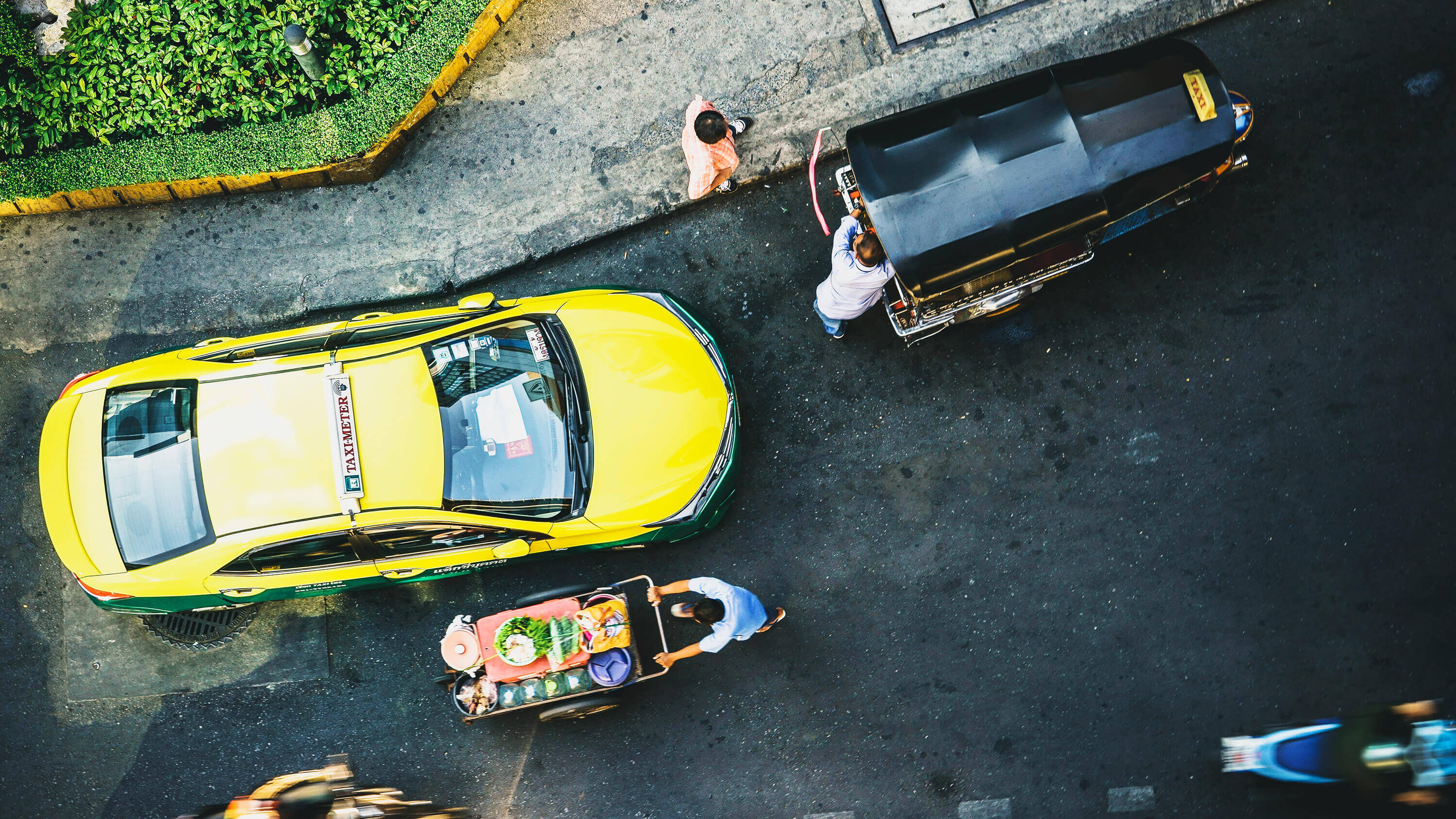The most common scams in Thailand in 2025
Read this guide to avoid getting scammed in Thailand
Like anywhere in the world that’s popular with tourists, there are scams in Thailand. Nobody likes being played for a fool, and being scammed leaves you bitter, and for some people, broke. Fortunately, most Thailand scams are easy to avoid and not all that common either. Here are the ones you’re most likely to run into, and the best ways to avoid falling for them.
Bangkok tuk-tuk scams
Most drivers of Bangkok’s famous three-wheeled tuk-tuks will overcharge you, and maybe take you to a restaurant where they get a commission, but a small minority of them will try to outright swindle you. These drivers wait near touristy areas like Khao San Road or the Royal Palace looking for marks. They then tell you that whatever destination you ask to be taken to is closed for renovation or a holiday and that they have somewhere better to show you. They might even offer to take you for free, but with a quick stop first.
These drivers will take you from place to place, each of which pays them a flat fee plus commission on anything you buy. There will be at least a tailor shop, a gem and jewelry store, and a restaurant. They will range from merely poor quality to outright fraudulent. The gems may be fake, the tailors use the worst synthetic fabrics, and some of these restaurants will bring a check for ten times what you expected to pay, and then bring back a different menu than what you ordered off of when you complain.
Avoiding the tuk-tuk scam
Luckily, these are easily avoided by only using tuk-tuks for A to B journeys, not full-day tours. In general, they’re slower than the trains and more expensive than taxis, but they are a true part of Bangkok and every visitor should at least try them out. Just keep your wits about you and never believe a driver telling you your destination is closed. Also, you should bargain as the first price they give you will almost always be too high. Never get in a tuk-tuk without first agreeing on the fare. For more on getting around Bangkok, see our post on transportation in Bangkok.
Tip: If you’re wondering what a fair price for a tuk-tuk ride is, check what a fare to the destination would cost if booked through the Grab App (the Uber of Southeast Asia). If a Grab costs 100 Baht, a tuk-tuk should run about 150 to 200.
Friendly guy on the street Bangkok scam
Pretty commonly in touristy areas of Bangkok, a guy will approach you on the street and ask you your name or where you’re from. These guys are almost always trying to run game on you, or at the very least put you into a Tuk Tuk that will overcharge you and pay him a cut. In general, Thais are very friendly and we’ve had some amazing adventures from just meeting strangers. But on the street in Bangkok, especially in touristy areas, these cold approaches are almost definitely a scam. Be polite but decline any invites and offers.
The Thailand jet ski scam
This one is extremely common in Pattaya and has been known to happen in Phuket and some smaller islands as well. The way this one works is this: after you’ve been out enjoying yourself on a jet ski, you return it and some minor cosmetic damage is pointed out by the renter. You are blamed even though you both know it wasn’t you who caused the damage, and extortionate repair fees are demanded. If the situation escalates at all, a cop will show up to help you… just kidding, the cop will be in on the scam and he’ll drive you to an ATM and probably threaten you with arrest or violence if you don’t pay up.
This one is so common in Pattaya that’d we’d advise against renting a jet ski there at all. In other places, check some online reviews and ask at your hotel for a recommendation for an honest rental place.
If you do fall for the scam, you can be polite but insistent that you did not cause the damage and will not pay. You will probably be safe doing this as long as you are out in a public place. Don’t go anywhere with them, and don’t get physically or verbally abusive even though you are in the right. Technically, property damage would be a civil issue, not a criminal one and you should not be arrested even if you did cause the damage. Just know that these criminals make their living doing this and will be very persuasive and threatening. It may be best to just pay, but at least try calling the tourist police at 1155.
WIFI network hacking
Public WiFi networks are not secure anywhere in the world, and that’s extra true in Thailand. This includes networks in hotels, restaurants, coffee shops, airports, and pretty much anywhere else you’ll connect from here. It is very easy for hackers to penetrate your phone or laptop when you connect to these networks. Thailand is also notorious as being a base for criminal gangs from Eastern Europe and around Asia, and while many of them are running scams that target people outside of Thailand, they are very tech-savvy and could easily tap into unsecured WiFi networks and steal people’s banking details, personal information, email accounts, and much more.
The way to avoid becoming a victim is to get a VPN (virtual private network). For just a few dollars a month you can protect yourself against these cybercriminals, and it’s important to have not only for your travels but in your home country as well. There are some free VPNs but they tend to be so slow you’ll end up not using them, and they won’t protect your phone. Check out our guide to the best VPN for Thailand and Southeast Asia travel to learn more.
ATM card skimming
Those criminal gangs mentioned above, they have another scam they run often in Thailand. What they do is install a device over the front of an ATM where you insert your card. This looks like it supposed to be there, and most people don’t notice and completed their transaction as normal. The problem is that the device has skimmed the information from your card as it passed through, and they can now clone your card and start draining your account.
There are two ways to protect against ATM card skimming scams in Thailand: The first is to whenever you can only use ATMs that are in or outside of actual bank branches. These are checked more regularly and are less likely to be targeted. There’s an additional benefit in that if for some reason your card isn’t returned or there’s an issue with the cash, you can speak with them in the bank. The second thing is to always give the ATM card slot a quick inspection. Make sure it doesn’t look bulkier than it should. Grab onto it and try to jiggle it, it shouldn’t move at all. Finally, as you should always do anywhere in the world, be aware of what’s going on around you when using an ATM, and cover the keypad well when you enter your PIN.
Motorbike rental scams
A very common one similar to the jet ski racket is dishonest scooter rental shops trying to charge for damages that the renter didn’t cause. This one is tough because so many tourists do crash here and cause damage to bikes. Some shops seem to have gotten so used to that extra revenue from charging for damages that they try to pry it out of you whenever they can. Shops either hold onto your passport or to a significant amount of cash so they hold the leverage.
The single best thing you can do to prevent this is to try to vet the rental shop. Renting directly from your hotel is often the best course. One thing that we find works well is searching “motorbike rental” in Google Maps and checking the reviews of different shops that are listed. No matter what, it’s important to take detailed photos of the bike when you first rent it so you can prove any existing damage was already there. Be warned though, some of the worst of these shops will point out some damage on the underside of the bike, and of course, nobody thinks to check there. They can be tricky.
Transportation booking scams in Thailand
This one is less of a regular scam and more of an unsavory business practice. In Thailand it’s quite common for travelers to book all-inclusive transportation to their next destination either with their hotel or a nearby travel agent. While most of these are legitimate businesses doing things the honest way, some will say anything to get you to buy so they can get their commission. Usually this would mean telling you everything is included only for you to find out later that you have to purchase your own ferry ticket, or that you only arrive at the island but still have to get a taxi to your hotel. By this point, you are out of sight, out of mind to the seller.
This one is pretty easy to avoid too. Anytime you book travel that is in any way complicated or has transfers, make sure everything that you are told is included is also written on your ticket or receipt. The receipt should have the company name and phone number on it, and really should also have their travel agent license number too. If they seem hesitant to write this for you, go book somewhere else.
Bus scams
Some of the dirt-cheap buses that run between Khao San Road and the islands in the South are able to keep their prices so low by stealing from their passengers. While you are sleeping through the long journey, someone is down below the bus combing through your luggage. This doesn’t happen on normal transportation in Thailand, just these backpacker buses so avoiding them should ensure this doesn’t happen to you. Also, never keep cash, credit cards, electronics or any other valuables in your non-carry on bag. For more, see our post Travelling with valuables and keeping them safe
Go-Go bar and ping pong show scams
In red light district areas, especially in Bangkok, a common swindle is for promoters on the street to invite you in for a free preview of a ping pong show (just in case you don’t know, this involves women doing different tricks with their vaginas – seriously). Once inside you’ll be told you need to pay up. You’ve put yourself in this situation and paying is probably the only way out. You’re already inside the dark of the bar and the bouncers would be only too glad to beat you up. Nothing is free.
Be alert but don’t forget to have fun
Thailand has its scams, and it has its corrupt police, and you need to be alert while you are here. But the same is true of just about anywhere else. In general, Thailand is a safe country and one that is very easy to travel in. Enjoy yourself but don’t get complacent. Always remember that some people will try to trick you out of money, but don’t forget that most people will not. Do this and your Thailand adventure will be as safe as it is epic.
Check out our Thailand etiquette guide for more tips on staying safe while traveling in Thailand.

